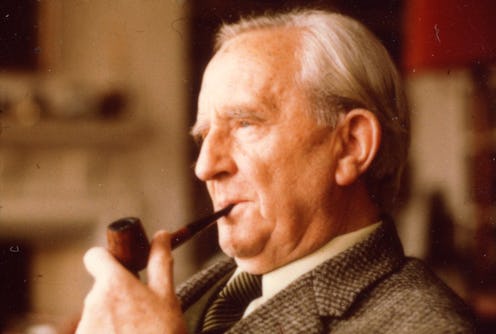Entertainment
Is J. R. R. Tolkien too Boring for Hollywood?

FOX Searchlight recently revealed that they will be undertaking a biopic on J.R.R. Tolkien's unexpected journey from South Africa to Oxford to bookshelves and theaters across America. Although this will be an exciting endeavor, it will also have to move beyond the boundaries of the typical Hollywood biopic. It will cover a series of topics that Hollywood doesn't find particularly sexy, such as an obsession with dead language and the inner workings of 1920's English academia.
The most popular biopics of the last 20 years all have very different styles and subjects, but they all involve certain elements of scandal surrounding their subject. Classic behind-the-music films such as Walk the Line and Ray show the gritty sides of drug addiction. Frieda and La Vie en Rose describe the difficulties of being an "eccentric" woman while trying to juggle fame and judgment, both involving multiple tragedies. Every good Hollywood hero needs a vice, and most biopics focus on either their struggles with it before fame, or after they have been thrust into the spotlight.
The Guardian and The Los Angeles Times have compared Tolkien to Finding Neverland and Saving Mr. Banks, but even these, with their seemingly innovative views of the famous authors behind Peter Pan and Mary Poppins include some salacious discoveries. J.M. Barrie, of Peter Pan fame, was often criticized in his lifetime for his relationship with the single mother and four boys who inspired the play, which may have boosted the play's popularity while condemning its creator. The upcoming Saving Mr. Banks centers on P.L. Travers' reluctance to make Mary Poppins into a film, making it the least tabloid-esque biopic controversy. Nonetheless, it frames Walt Disney's quest to make the film as a tale of dogged perseverance, making it seem even more dramatic than it probably was.
Now, I will admit that there are some elements of J.R.R.'s life that could almost meet the standards of silver-screen-drama, but overall, his early life did not unfold in a way befitting the classic biopic. It has already been announced that Tolkien will cover the writer's early days at Oxford, as well as his service in World War I. Sure, Hollywood could capitalize on the tragic death of Tolkien's parents, and his benefactor's later forbiddance of his teenage relationship with Edith Bratt, a woman three years his senior.
Once Tolkien hits adulthood, which is where this biopic supposedly focuses, his life becomes relatively drama-free. In perfect obedience with his guardian's wishes, he proposed to Edith once he was of age, and they were happily married soon after. At Oxford, Tolkien was a respected student and scholar, able to learn dead Germanic, Anglo-Saxon and Norse languages at a surprising rate. He was beginning to gain respect for his work on Beowulf, and laying the groundwork for the definitive translation of Sir Gawain the Green Knight, which he would release in 1925 with a colleague. All of this shows his brilliance for language and commitment to academia, but there is no element of intrigue, no sex-under-the-desk to offset his brilliance and hard work. In short, Tolkien's academic career was fascinating, but not as gossip-inducing as most Hollywood biopic subjects.
His time in World War I does not encourage much more confidence in a shocking plot twist. Although Tolkien was a brilliant code-breaker and served in the Battle of the Somme, he, like many other Great War soldiers, succumbed to trench fever, not battle wounds, and was ill for most of the action. Also, few films have been made about WWI itself, because of the perceived lack of ideals behind the warfare, and the death of the last living American veteran in 2011. Although I personally think that WWI warrants many movies (about the horrors of the first chemical weapons, for example), it won't spawn romanticized Hollywood fictions like Pearl Harbor.
Even the publishing of The Hobbit , which would make an excellent flash-forward in the film, is not extraordinary. Tolkien began telling stories of hobbits to his family members, and wrote stories in his free time for stories that would be published after his death. The Hobbit only made it to shelves because a student of his shared it with a publisher. Tolkien was almost uninvolved in the discovery of his first work.
Hopefully, the respectable-but-mundane nature of Tolkien's early university days will bring about an innovative addition to the biopic genre. Maybe Tolkien-obsessed screenwriter David Gleeson will be able to touch on the intellectual fire that colored his connection between linguistics and literary themes. An honest discussion of how Tolkien shaped linguistic study, as well as fantasy, would be a thought-provoking alternative to the movie adaptation of 50 Shades of Grey. Viewers who hope that Tolkien dreamed up Bilbo out of an opium-induced stupor in a brothel near Oxford will be sorely disappointed. Personally, I am hoping Tolkien will breathe new life into an almost played-out genre, just as the real J.R.R. Tolkien did with the fantasy novel.
Photo: ElephantJournal.com